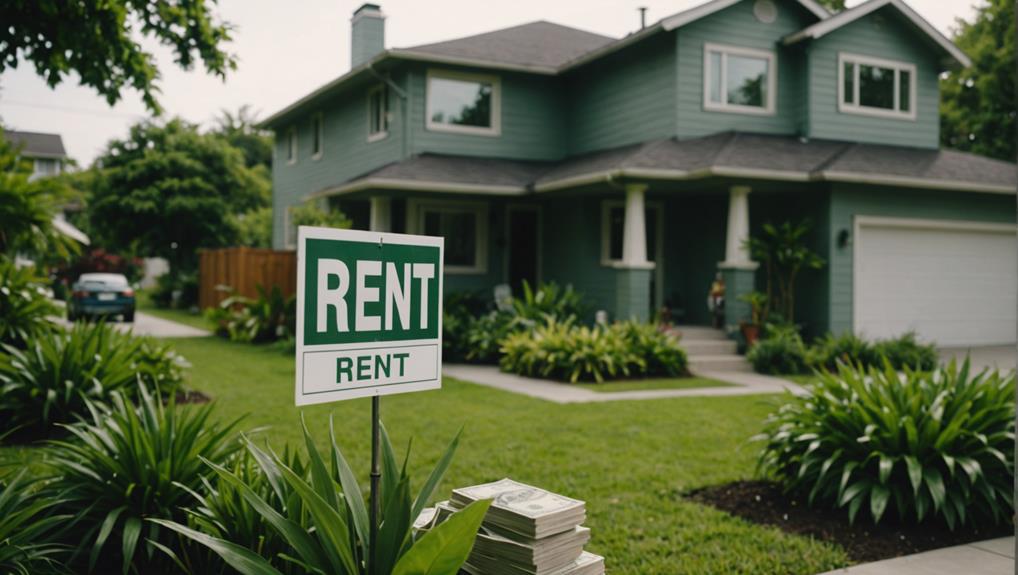Embarking on a real estate investment journey with a modest $10,000 can be strategic if approached with the right knowledge and tools. Leveraging house hacking strategies, investigating the potential of real estate crowdfunding, and understanding rental property down payments are key. Real estate partnerships and other innovative methods can also significantly boost your investment portfolio.
By exploring these 10 savvy moves, you will uncover practical and effective ways to make your $10k work harder in the real estate market, opening up opportunities previously unconsidered.
Key Insights
- Invest in Real Estate Investment Trusts (REITs) to access the real estate market and receive regular dividend income.
- Use real estate crowdfunding platforms to pool funds with other investors for diverse property investments.
- Implement house hacking by renting out spare rooms or units in a multi-family home to generate rental income.
- Join real estate partnerships to pool resources and share responsibilities, maximizing returns and minimizing risks.
- Explore tax lien investing to potentially acquire properties at a fraction of their market value and earn high returns.
House Hacking Strategies

House hacking offers a practical approach to real estate investing by allowing homeowners to generate rental income from their primary residence. By renting out part of the home, such as spare rooms, basements, or garages, homeowners can offset housing costs and build equity.
Investing in multi-family homes is another effective strategy. Living in one unit and renting out the others facilitates gradual growth of an investment portfolio, particularly for beginner real estate investors with limited funds. This method helps generate passive income and boosts financial resources, making it a smart way to leverage a primary residence for real estate investment while reducing living expenses.
Real Estate Crowdfunding

Real estate crowdfunding offers investors access to a variety of real estate projects with relatively low entry barriers, often requiring investments ranging from $500 to $5,000. Platforms such as Fundrise and RealtyMogul enable participation in both residential and commercial ventures.
Investors can earn passive income through dividends or potential property appreciation without the need for direct management. This approach provides an accessible, hands-off method for real estate investing, making it an appealing option for those seeking to diversify their portfolios with modest capital.
Diverse Investment Opportunities
Crowdfunding platforms such as Fundrise and RealtyMogul enable investors to pool resources and participate in lucrative real estate opportunities with a minimum investment as low as $500. Real estate crowdfunding presents a unique way to diversify investment portfolios, offering access to commercial, residential, and mixed-use properties. This diversification helps mitigate risks and potentially boost returns.
These platforms also provide a high level of transparency, allowing investors to track their investments, view detailed property information, and monitor performance with ease. Real estate crowdfunding opens up markets that were previously inaccessible due to high costs, making it an attractive option for those looking to start investing with a modest sum.
Low Entry Barriers
Real estate crowdfunding platforms have revolutionized access to profitable property markets for investors with limited capital. These platforms, such as Fundrise or RealtyMogul, offer low entry barriers, allowing individuals to start investing with as little as $500. By pooling their funds, investors can gain access to a diversified real estate portfolio, eliminating the need for large sums of money or direct property ownership.
Investors can choose from various projects, including residential, commercial, or mixed-use properties, tailoring their investments based on preferences and risk tolerance. This democratization of real estate investment opens up passive income opportunities and is particularly well-suited for beginners seeking capital appreciation.
Passive Income Potential
Real estate crowdfunding platforms offer investors a steady stream of passive income through rental yields and property appreciation. By pooling funds, individuals can access larger real estate projects with lower capital requirements.
Initial investments can start as low as $500 to $1,000, making platforms like Fundrise and RealtyMogul accessible to those with a budget of $10,000. These platforms provide diversified portfolios managed by professionals who handle property acquisitions, renovations, and tenant management.
Investors receive regular distributions and potential capital gains, enhancing their passive income potential. This approach allows a modest investment to grow into a substantial real estate portfolio through the power of crowdfunding.
Investing in REITs

Investing in Real Estate Investment Trusts (REITs) offers a practical way for individuals to access the real estate market with a modest capital of $10,000. REITs allow investors to purchase shares in companies that own, operate, or finance income-producing properties across various sectors, including residential, commercial, and retail.
This strategy yields passive income through regular dividend distributions, as REITs must pay out at least 90% of their taxable earnings to shareholders. Additionally, REITs provide diversification and liquidity, enabling investors to capitalize on real estate market trends and benefit from professional management without the burdens of property ownership.
With $10,000, investors can achieve both capital appreciation and consistent dividend income.
Rental Property Down Payments

Securing a down payment for a rental property is a crucial step in leveraging your $10,000 to enter the real estate market. Typically, down payments for rental properties range from 15% to 25% of the purchase price.
To maximize your investment, consider leveraging low down payment loan options such as FHA or portfolio loans to reduce the initial financial burden.
Seek investment properties within your budget that require smaller down payments. House hacking with a multi-unit property can also minimize out-of-pocket expenses.
While real estate investment trusts (REITs) offer an alternative investment avenue, focusing on down payment strategies for physical properties provides more direct control and potential for rental income.
Real Estate Partnerships

Real estate partnerships can enhance your $10,000 investment by pooling resources with other investors, thereby increasing purchasing power.
Partnering with experienced individuals provides access to valuable industry knowledge and shared investment opportunities that might otherwise be inaccessible.
Strategic Partner Benefits
Partnering in real estate enables investors to access larger deals and opportunities that might otherwise be unattainable. These partnerships leverage the combined resources, skills, and experience of multiple investors to reduce risks and maximize returns. By collaborating, individuals can share responsibilities and workload, utilizing each other's strengths to achieve common goals.
Resource Pooling: Investors combine financial resources to invest in larger, more profitable properties.
Skill and Experience Sharing: Novice investors benefit from the knowledge and expertise of experienced partners.
Risk Mitigation: Distributing investments across a partnership minimizes individual risk exposure.
Selecting the right partner is crucial. Aligned goals, effective communication, and mutual trust are vital for success in real estate partnerships.
Shared Investment Opportunities
Real estate partnerships enable investors to leverage combined resources and expertise, accessing larger and more lucrative investment opportunities that may be beyond their individual financial reach. By pooling resources, investors can partake in deals that would otherwise be unattainable. These partnerships also offer novice investors valuable mentorship and guidance from more experienced partners, thereby mitigating risks.
Shared investment opportunities facilitate portfolio diversification, spreading financial risks across various properties and markets. Collaborating with partners opens doors to new markets and innovative investment strategies, fostering potential growth.
Well-structured partnerships enhance networking opportunities, increase access to funding, and distribute the workload, making real estate investments more manageable and potentially more profitable.
Fix-and-Flip Opportunities

Fix-and-Flip Opportunities
Fix-and-flip opportunities provide a valuable entry point for investors aiming to maximize returns with a modest initial investment of $10,000. Joining house-flipping groups can offer insights and support from experienced flippers, enhancing your investment strategy. DIY property renovation helps save costs, optimizing the use of initial capital. Calculating return on investment (ROI) is crucial to ensure profitability.
When evaluating potential properties, consider the following factors:
- Location: Target emerging neighborhoods with high buyer demand.
- Renovation Costs: Accurately estimate both the expenses and the time required to complete the project.
- Resale Value: Evaluate the potential resale value post-renovation to ensure a profitable margin.
Successful fix-and-flip projects can rapidly increase the value of your real estate portfolio.
Real Estate Wholesaling

Real estate wholesaling offers a lucrative opportunity for investors with $10,000, requiring minimal capital while promising significant returns. Success hinges on identifying profitable wholesaling opportunities and mastering the negotiation of wholesale contracts.
Building a network of motivated sellers and cash buyers, along with honing effective marketing and negotiation skills, significantly boosts the chances of securing profitable deals.
Finding Wholesaling Opportunities
To identify profitable wholesaling opportunities, a strategic approach combined with thorough market research is essential. Real estate wholesaling focuses on finding deeply discounted properties and leveraging a network of motivated sellers. Success hinges on three key areas:
- Building a Network: Engage with real estate agents, contractors, and other professionals to uncover off-market deals.
- Market Analysis: Research local market trends, property values, and neighborhood dynamics to pinpoint lucrative prospects.
- Direct Marketing: Use direct mail campaigns, online advertising, and social media to reach potential sellers.
Negotiating Wholesale Contracts
Mastering the art of negotiating wholesale contracts is crucial for investors aiming to capitalize on real estate wholesaling opportunities. This process involves acquiring distressed properties at a significant discount through effective negotiation skills.
Investors then assign these contracts to end buyers, earning a fee without the need for substantial capital investment. Successful wholesalers must excel in negotiating favorable terms, often under tight timelines, to secure profitable deals.
Market knowledge and a strong network are essential for swiftly identifying distressed properties and potential buyers. By effectively leveraging a $10K investment, investors can transform negotiated wholesale contracts into lucrative opportunities, gradually building a profitable real estate portfolio.
Effective negotiation is the cornerstone for maximizing returns and minimizing risks in real estate wholesaling.
Tax Lien Investing

Tax lien investing provides an opportunity to earn substantial returns with relatively low initial capital. By purchasing delinquent property tax liens, investors can achieve high returns, often with interest rates ranging from 18-36%. With just a few hundred dollars, individuals can begin building a real estate portfolio.
Key benefits of tax lien investing include:
- High returns: Interest rates can be significantly higher than traditional investments.
- Low entry cost: A modest initial investment makes this approach accessible for beginners.
- Potential property acquisition: If the property owner fails to redeem the lien, investors may acquire the property at a fraction of its market value.
Success in this field requires thorough research on properties and their profitability.
Real Estate Education

Acquiring a strong foundation through real estate education is essential for maximizing the potential of your $10,000 investment and navigating the complexities of the market. Engaging in real estate courses provides fundamental knowledge on terminology, laws, and market trends. Reading real estate investment books offers in-depth insights into strategies such as cash flow, cap rates, and ROI. Real estate blogs and podcasts deliver current industry developments and practical tips from experienced investors. Using a combination of these resources ensures continuous learning and informed decision-making.
| Resource Type | Benefit | Emotional Impact |
|---|---|---|
| Real Estate Courses | Structured, comprehensive learning | Confidence |
| Investment Books | Detailed strategies and concepts | Empowerment |
| Blogs and Podcasts | Real-time updates and networking opportunities | Inspiration |
Saving Strategies for $10K

Creating a strong saving plan is essential to accumulate the $10,000 needed for your initial real estate investment. Implementing effective strategies can accelerate your progress.
Consider setting up a separate savings account to avoid using these funds for other purposes. Automatic transfers from your paycheck can ensure consistent growth. Budgeting for unexpected expenses is crucial to avoid setbacks.
- Daily Savings: Save $10 per day, accumulating $3,650 annually.
- Cut Unnecessary Expenses: Reduce dining out and cancel subscription services.
- Utilize Tools: Use budgeting apps or spreadsheets and real estate calculators to track and optimize savings.
These strategies can help you reach your $10K target efficiently.
Conclusion
Investing $10,000 in real estate can be approached strategically through various methods, each offering unique benefits. House splitting, real estate pooling, and investing in REITs provide low entry barriers and the potential for passive income.
Additionally, making down payments on rental properties, engaging in real estate collaborations, and pursuing wholesaling can diversify your portfolio and increase purchasing power.
Tax lien investing, prioritizing real estate education, and implementing effective saving strategies further enhance investment opportunities. These approaches maximize the potential of a modest initial investment, laying a solid foundation for future financial growth.





